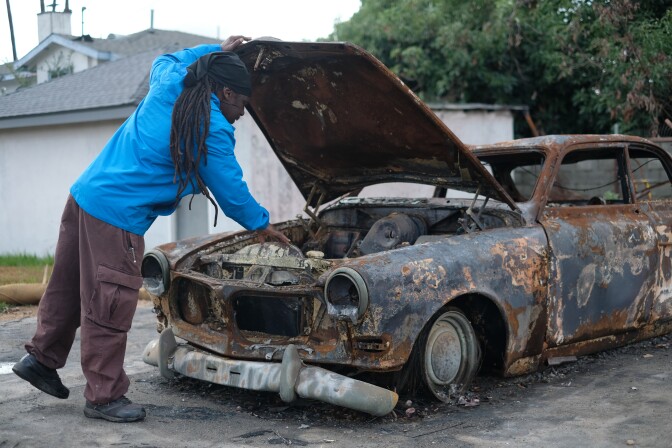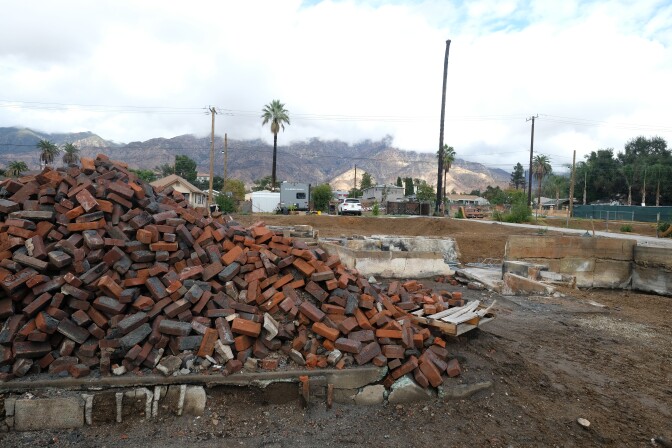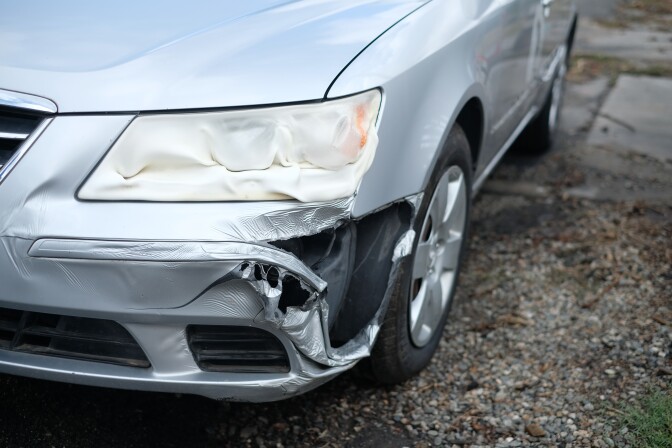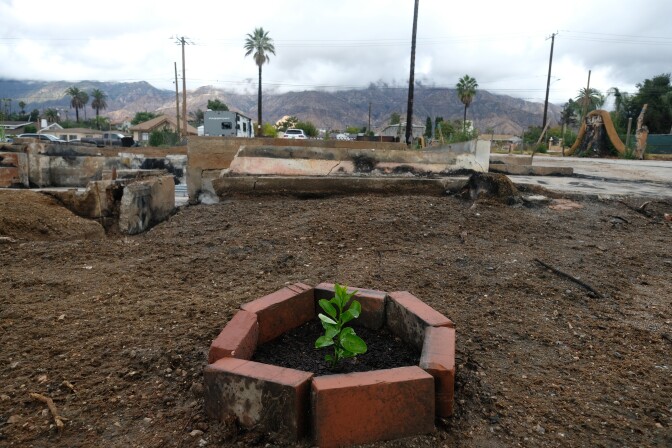This story is free to read because readers choose to support LAist. If you find value in independent local reporting, make a donation to power our newsroom today.
An uninsured Altadenan is determined to rebuild. Will the obstacles be insurmountable?

Alphonso Browne pulls open the gate to his property, revealing a wide dirt lot, the concrete foundation of his former home and a pile of bricks that once framed his wraparound porch.
At the back of the lot, where there used to be a garage, two burnt-out classic cars remain — a 1947 Dodge pickup and a 1964 Volvo sedan. The Volvo was Browne’s favorite from his once-expansive antique collection.
At the front of the lot, there’s a new trailer Browne and his wife bought with the help of FEMA funding.
“We have this for a backup, just in case the temporary housing runs out,” Browne says.
The Brownes have lived in Altadena, just west of Lake Avenue, for more than 30 years. They raised four children in their 1912 Craftsman.

The only negative of the house, Browne recalls, was its lack of insulation.
“Otherwise, I wouldn’t change the house for nothing, except now Mr. Eaton makes us change it,” he says with a smile and soft laugh.
Browne, a retired bus driver, and his wife, Celestine, a former mail carrier, have been moving from place to place since losing their home: the Pasadena Convention Center for a month, various hotels and finally a small senior housing apartment in Pasadena, which they are paying for with FEMA funding.
They’re about to apply to renew their application for that temporary housing, which lasts up to 18 months.
“If they approve it, then great. If they don't, then, you know, we have to depend on another organization,” Browne says.
Or they’ll move into the trailer.
The Brownes live on a fixed income. They want to rebuild, but there’s a major obstacle: They were dropped by their homeowners insurance a month before the fire.

Browne points to the stump of what was once a large oak tree shading the home.
“They determined that the branch was hanging over the roof,” Browne says of his insurance company, Liberty Mutual. “I had some Christmas garlands on the side, hanging over the roof of the patio.”
And he had 10 vehicles, mostly classic cars, in the back. All reasons he was given by his insurer for dropping him.
A spokesperson said Liberty Mutual can’t comment on specific cases.
“Each risk is considered on its own merits,” the spokesperson wrote in an email. “It’s important to fully consider the condition of a property, which could include roof health, overhanging trees and excessive growth and debris that presents potential loss.”
Rebuild resources
Neighborhood Housing Services of L.A. County:
- How to get help: Go online, call (213) 381-2862 or stop by the Eaton Fire Collaborative at 540 W. Woodbury Road in Altadena.
- How to get help: Go online, call (213) 381-2862 or stop by the Eaton Fire Collaborative at 540 W. Woodbury Road in Altadena.
- Visit a One-Stop Permit Center in the Eaton and Palisades burn areas.
- PostFire LA provides an online hub of resources for fire survivors.
The Brownes do have $400,000 from their mortgage lender’s insurance, but that’s far from the amount they need to rebuild. Browne says most of the estimates he’s received from contractors to rebuild what he had come in at over $1 million.
“That's why I'm telling these people, please quit using the word that you’re here to help me when you’re only here to help yourself,” Browne says.
The couple has been cobbling together what they need through GoFundMe, as well as county, state and philanthropic funds. They’ve gotten $18,000 here, $10,000 there, though most grants offer just a few thousand dollars at most.
“We’re just saving it to go toward the rebuild,” Browne says. “We’re not just going along, spending, buying cars. This is our focus.
“Whether it takes one year or 10 years, we are going to rebuild.”

A lack of long-term rebuild aid
The lack of direct, long-term financial aid for rebuilding is one of the biggest issues facing fire survivors who are underinsured or not insured at all, several experts told LAist.
“Homeowners need more direct support and clarity,” says Gabriella Carmona, a senior research analyst at UCLA’s Latino Policy and Politics Institute, who cowrote a new analysis about the issues facing fire survivors.

That report found that a small percentage of survivors have sold their properties, and roughly 70% have yet to take any steps to rebuild.
Black homeowners, who were disproportionately affected by the Eaton Fire, were more likely to be stalled in their progress nine months on.
Another recent report, by the nonprofit Department of Angels, found most survivors are being forced to dig into their savings and take on debt.
“This slow pace could be shaping who eventually comes back and what Altadena ends up looking like a couple years from now,” Carmona says.
How could recovery be improved? Carmona suggests expedited insurance payouts, more technical assistance and financial counseling for survivors, more bridge funding for the long-term recovery and better transparency and data about who has and hasn’t received resources.

For the Brownes, even with the help of a case manager from Community Organized Relief Effort, funding that moves the needle on rebuilding is almost impossible to come by.
“Why is it more than half of Altadena residents are still in the same square that we was on Jan. 8?” Browne asks.
For example, philanthropic funds have been allocated to a variety of nonprofits, all focused on different aspects of recovery and all with their own vetting and application requirements to disperse the funds. It’s hard to find the grants, and if survivors do, some, like Browne, get baffling rejections.
Federal funds further stalled by shutdown
Another major snag? Congress has yet to appropriate federal funds to assist survivors with long-term recovery.
In late February, Gov. Gavin Newsom requested nearly $40 billion in federal aid. Congress has yet to act, and the government shutdown has stalled any further discussion.
Lori Gay, president of Neighborhood Housing Services of L.A. County, which is working with more than 1,000 fire survivors, says her group is seeing an unprecedented number of under- and uninsured households. The lack of federal funding is only adding to the strain.

“There's not some big check coming, so then what?” Gay says. “Most of the gaps we're seeing are up to $250,000 that people are short in being able to rebuild. So who pays for that? Nobody planned to burn homes. This is something that happened to families.”
One federal program that can be instrumental in filling such gaps is the Community Development Block Grant-Disaster Recovery. The funds are significant — households in the town of Paradise, which was razed in the 2018 Camp Fire, received funding up to $500,000, more in some cases, to assist with their rebuilds.
But that funding didn’t get to Paradise until more than two years after the Camp Fire.
“If that's kind of normal programming, will people make it that long if they're trying to hold out?” Gay asks about survivors of the Eaton and Palisades fires. “What happens if it doesn’t show up at all?”
The uncertainty about federal grants worries Robin Hughes, an Eaton Fire survivor and board member of the Altadena Builds Back Foundation. “I fear we will not be able to rebuild Altadena without these federal resources,” Hughes says.
The Altadena Builds Back Foundation is working to fill the gap of long-term rebuilding needs by launching a program with San Gabriel Valley Habitat for Humanity to rebuild homes of multigenerational families and seniors on fixed incomes.
What lies ahead
The slow pace and limited funds available for such programs could force people to take on debt, Hughes and Gay worry.
Or make a tough decision to sell and relocate.
Or people may take early payouts through Southern California Edison’s Wildfire Recovery Compensation Program.

That may end up being the case for Browne, who is seriously considering dropping his lawsuit against Edison and joining the utility’s payout program, if the details make sense to him when they’re released.
“I don't want to be rich,” Browne says. “I just want the house back.”














